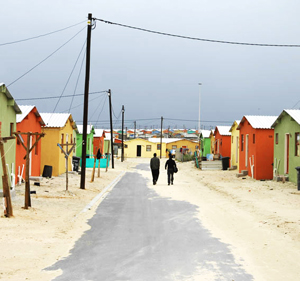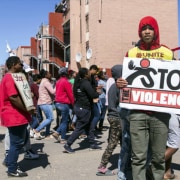|
Getting your Trinity Audio player ready...
|
 By Lorraine Louw
By Lorraine Louw
Work has started in earnest for the commission of inquiry announced by Premier Helen Zille into the breakdown in relations between the police and residents in Khayelitsha, in Cape Town. The commission opened its offices to the public on 11 September. It was announced by the premier on 22 August, has been gazetted and issued its first notice of procedure on Thursday, 6 September.
It is headed by Judge Kate O’Regan, the retired Constitutional Court judge, who is also a Corruption Watch board member.
It is still early days, though. Amanda Dissel, the commission secretary, said: “We are officially open and we are working, but as not many people know about it yet, we have not received any complaints this [Tuesday] morning.” The commission would be advertising in various media, distributing leaflets, meeting with the community and holding public outreach exercises, she added.
Welcoming the inquiry, the civil society organisations that brought the initial complaints to the premier’s attention, pointed out: “This is the first time in South Africa that a community and civil society has won the right for this section of the Constitution to be invoked.”
Although the South African police is a national competency, a premier may call for a commission of inquiry. It was established in terms of sections 206 of the Constitution, read with the Western Cape Constitution and the Provincial Commissions Act of 1998, Zille said.
 Explaining its function, in its first notice the commission said: “The Constitution provides that every resident of our country is entitled to a police service that prevents, combats and investigates crime, maintains public order, protects and secures them and their property and upholds and enforces the law.
Explaining its function, in its first notice the commission said: “The Constitution provides that every resident of our country is entitled to a police service that prevents, combats and investigates crime, maintains public order, protects and secures them and their property and upholds and enforces the law.
“The Commission’s mandate is thus focused on ensuring that the objects of SAPS as set out in the Constitution are achieved as far as the residents of Khayelitsha are concerned. The task is twofold: first, to investigate the complaints and the alleged breakdown of trust and secondly, if the complaints of inefficiency and/or the allegation of a breakdown in the relationship between Khayelitsha residents and SAPS are found to be true, to recommend solutions.”
Civil society at work
The group of civil society organisations, represented by the Women’s Legal Centre, first lodged a complaint with the Premier’s Office on 28 November 2011, calling for an inquiry. “The complaint alleged that there was systemic failure by the SAPS in Khayelitsha to prevent, combat and investigate crime, take statements, open cases and apprehend criminals, resulting in a breakdown in relations between the community and the police,” Zille said.
It was claimed that this led to at least 14 vigilante killings, “where residents have taken the law into their own hands to exact ‘mob justice’ because they have no faith in the ability of the police to undertake thorough investigations, make arrests or render the requisite assistance to secure convictions in reported criminal cases”.
Sanja Bornman of the Women’s Legal Centre explained that it represented five community-based organisations that had been working directly with the Khayelitsha community, in some cases for up to 10 years. “These organisations have been at the coal face of the disintegration of the relationship between the police and the community, and have been trying to get the attention of authorities and decision makers for a long time.
The other organisations are the Social Justice Coalition, the Treatment Action Campaign, the Triangle Project, Equal Education and Ndifuna.
“Khayelitsha experiences a disproportionate amount of crime, and gender-based violence. WLC has learnt of this through its free legal advice office in Khayelitsha. So, when the organisations approached us with their concerns, we agreed that it was time to act … The organisations drew on their work and submitted evidence [to the premier] in the form of testimonies and case studies to demonstrate the basis of the complaint, and why we wanted a commission of inquiry,” Bornman said.
Vigilante justice was not a new phenomenon in Khayelitsha, and reports of vigilante killings or other violent incidents could be found in the press from many years ago, she added. “In this way, the lack of proper policing has resulted in severe erosion of the rule of law, which is supposed to a basic tenement of our democratic state, and respect for human rights.”
Looking for causes
The commission will investigate the complaints already received, and particularly the reasons for, and causes of them. It will submit a report to Zille within six months of its findings and recommendations, which will then be considered when the Western Cape government makes recommendations to the national minister of police.
Bornman hoped the commission would “lift the lid on the rotten situation in Khayelitsha. We want the commission to gather all stakeholders together, and to facilitate honest conversation about what is happening in Khayelitsha, and why the police are failing that community. We want the commission to identify the reasons for the inefficiency, corruption, and breakdown, and to make recommendations for improving the situation.”
Asked how important it was to have an active civil society when it comes to tackling corruption, Bornman said its importance could not be emphasised enough. “If people do not stand up and make their experiences known, officials can never be held accountable, and corruption is allowed to continue unchecked.
“Our democracy is premised on a public that participates in processes such as the commission of inquiry, and refusing to be subjected to a policing system that does not serve them in the way the law prescribes. South Africans cannot be bystanders in their own lives,” she stressed.
Advocate Vusumzi Patrick Pikoli joins Judge O’Regan as a commissioner, and advocates Nazreen Bawa and Thembalihle Sidaki are assisting. The commission’s offices are on the third floor of the Harare Library Building, Violence Prevention Through Urban Upgrading Centre, 42 Ncumo Street, Harare, Khayelitsha. It is open to the public between 9am and 3pm on weekdays and between 9am and 11am on Saturdays until 12 October.






